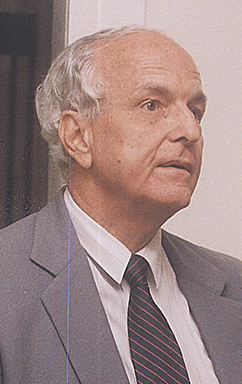(Today marks the 10th anniversary of the passing of, Mr David de Caires, the founder and first Editor-in-Chief of the Stabroek News. From the launch of the newspaper in November 1986 up to the time of his passing, de Caires fought unremittingly here and in the region for the cause of press freedom. He envisaged the newspaper as providing a forum for all voices particularly those who had no access to decision-makers and who had been cowed by years of repression. A lasting legacy of his work is the flowering of the letter pages and latterly its digital version in the form of comments to stories on its online edition. His contribution to the profession of journalism will forever be remembered. In his memory, we reprint today an address he delivered to the Guyana Bar Association at its annual dinner on the 4th December 1999 at the Georgetown Club.)
I find myself tonight in the position of a poacher turned gamekeeper. After having practised law for over thirty years from 1960 to the early 1990s I have spent the last eight years looking at the profession as an outsider. I reveal no secrets when I tell you that the general view held of your profession, here and elsewhere, is not a flattering one. Lawyers are widely perceived to be unreliable, avaricious and incompetent. The Dickensian image has never faded and the modern equivalent of the case of Jarndyce is still no doubt alive and well. It was Jeremy Bentham, the apostle of utilitarianism, who said that “lawyers are the only persons in whom ignorance of the law is not punished”. More recently, the novelist Doris Lessing, presumably as a result of her own experiences, remarked that “in university they don’t tell you that the greater part of the law is learning to tolerate fools”. This sounds just like the sort of remark that might be made by one of our own well known senior counsel, who shall be nameless. And the Godfather author, whose knowledge of the mafia must lend some respect to his proposition, wrote that “a lawyer with his briefcase can steal more than a thousand men with guns”. A deadly accolade indeed.
Yet despite the unflattering remarks down the ages, from Shakespeare to Puzo, and despite the known abuses, we are also aware that your profession continues to play a vital role, together with the judiciary, in upholding the rule of law which is such a vital part of our democracy. The basic rights of citizens are still upheld in our courts, the writ of habeas corpus continues to safeguard our freedom from arbitrary arrest and detention, the presumption of innocence still applies in criminal cases though there have been suggestions from reputable sources that it should be qualified in some types of cases, contracts are still enforced and damages awarded for torts though with far less promptness than most citizens consider desirable. The fundamental structure of the common law and the statute law that we inherited is still with us, strengthened by our constitution which is in the process of being changed, and the basic duty of your profession surely is, as it always has been, to uphold the rights of citizens and the rule of law.

